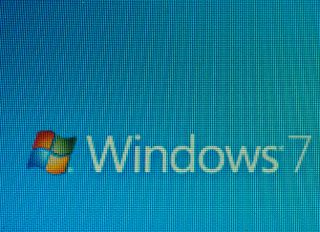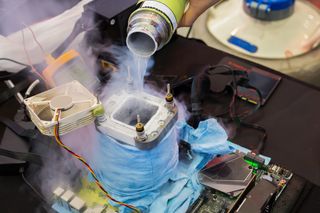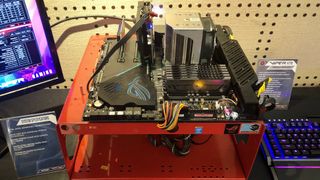
One man’s trash is another man’s treasure, and while many are throwing out Windows 7 since it reached end-of-life (EoL) this week, there’s at least one group of tech enthusiasts who plan to continue using the outdated operating system. Professional overclockers don't care that Microsoft will no longer issue security updates or patches for the OS it debuted in 2009. Instead, they prefer Window 7's lighter footprint, which allows for speedier benchmark results.
“We care more about performance than security,” professional overclocker Joe Stepongzi, also known for Bearded Hardware, explained to Tom’s Hardware. “It’s all about bleeding-edge performance. Windows 10 is quite large and excessive compared to Windows 7, so I see Windows 7 [still] being used to gain some points in some benches.”
Allen “Splave” Golibersuch also uses the OS for competing because it's a “low-resource platform."
“It is highly tweaker-friendly, and its longevity has led to many smart people cracking the bits that help it be so speedy. There’s no bloat built in, like Cortana et cetera,” he told Tom’s Hardware. “Nothing is more frustrating than when you are chasing a world record on liquid nitrogen cooling, and Windows 10 starts doing an automatic update -- even when there is no Internet connection!”

The general perception is that legacy benchmarks run better on the platform for which they were originally designed. In fact, some of the benchmarks overclockers use to compete, such as the PCMark Vantage and PCMark 05 PC benchmarks, won’t run properly on Microsoft’s latest OS.
“PCMark Vantage requires debugging to get working, and PCMark 05 doesn't run on Windows 10 at all,” pro overclocker Charles Fugger told Tom’s Hardware.
Splave also plans to keep using Windows 7 for certain benchmarks and certain platforms.
“Current-generation AMD, for instance, does not have very good support for even Windows 8, let alone Windows 7. Ryzen Master [overclocking software] will not even install. Intel X299 Windows 7 is definitely my go-to OS for performance,” Splave said.
Stepongzi will also continue leveraging Windows 7, which he described as being “great for performance” ever since its release. However, he does suspect that eventually newer PC platforms will lose the ability to support Windows as new drivers come with newer hardware releases.
Of course, these tech extremists know all about Windows 10. In fact, all three of these pro overclockers have Windows 10 on their personal computers. But for competitive overclocking, Windows 7 offers less bloatware and overhead than its younger sibling, and 32-bit benchmark applications favor older OSes, as Fugger put it.

It’s even commonplace for overclockers to use Windows XP, which came out in 2001 and hit EoL in 2014, for benchmarks, including wPrime, a multi-threaded benchmark for x86 CPUs, and SuperPi -32M, for testing speed and stability.
“An example of that is ... SuperPi XS, where we can see the performance reduction on every OS, including Windows 8 and Windows Vista,” Fugger said. “Windows XP is the best OS for SuperPi, and overclockers will go to great lengths (very far beyond normal) to install Windows XP on modern hardware. I am understating the ‘great lengths,’ -- this is a trade secret to some people.”
So if you’re mourning Windows 7, perhaps you can take some solace in knowing that there are some overclockers out there who will be using it for a long time to come.
"hardware" - Google News
January 17, 2020 at 04:47AM
https://ift.tt/2RpOcrr
Windows 7 Is Dead. But not for Professional Overclockers - Tom's Hardware
"hardware" - Google News
https://ift.tt/34VCCtX
Shoes Man Tutorial
Pos News Update
Meme Update
Korean Entertainment News
Japan News Update
No comments:
Post a Comment